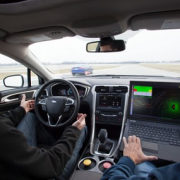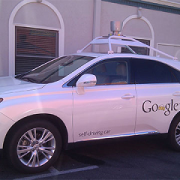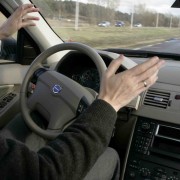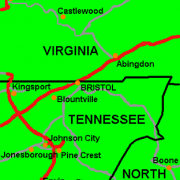Burney Simpson
Legislation moving in the California State Assembly calls for the Department of Motor Vehicles to step back from the draft regulations on driverless vehicles it announced in December.
Two proposals take shots at the California DMV’s oversight of autonomous vehicles.
The General Assembly chamber passed the third Thursday with a unanimous 71-0 vote.
That proposal is not confrontational, asking for an exemption to DMV rules so fully-autonomous shuttles can operate at a business park near Silicon Valley, a first for the U.S.
![GoogcarCalif2]() But the overwhelming approval of the proposal indicates that legislators want the DMV to step back from its tough approach to driverless regs, according to the sponsor, Assemblywoman Susan A. Bonilla.
But the overwhelming approval of the proposal indicates that legislators want the DMV to step back from its tough approach to driverless regs, according to the sponsor, Assemblywoman Susan A. Bonilla.
“This (bill) could prod and show the DMV the interests of the legislature,” she said. “The state wants to move forward on driverless vehicles.”
The proposals follow Google’s public disagreement with portions of the DMV’s draft, and its announcement that it would test its driverless vehicles in Kirkland, Washington, and Phoenix. (See “Google Expands Self-Driving Car Tests to Phoenix, Arizona”).
The DMV’s draft called for driverless vehicles to have steering wheels, pedals and other traditional equipment, that a driver be in the vehicle, and that the driver have a special certificate for operating the cars.
The agency said that the rules must be strict to ensure public safety while the technology evolves.
Google said the draft failed to recognize the rising capabilities of the technology, and would make it near-impossible to develop vehicles that could be used by the blind, people with disabilities, and others who can’t drive.
TEXAS-SIZE COMPETITION
The first proposal that challenges the DMV is by Assemblywoman Ling Ling Chang, a Republican from Diamond Bar.
The Transportation Committee on Monday approved Chang’s AB 2682 that would require the California DMV to hold public hearings if the National Highway Traffic Safety Administration (NHTSA) proposes a model state policy on driverless vehicles.
![GoogCarAustin2]() NHTSA has already pledged to meet a July deadline for finishing the policy document. It held a public hearing on the guidelines on Friday in Washington, D.C., and plans a second on April 27 at Stanford University in Silicon Valley.
NHTSA has already pledged to meet a July deadline for finishing the policy document. It held a public hearing on the guidelines on Friday in Washington, D.C., and plans a second on April 27 at Stanford University in Silicon Valley.
In effect, Chang’s proposal would require the DMV to openly debate the model state policy.
Chang said in a release her bill is designed to make California more competitive so it can grow driverless business activity in the state.
“We are competing with business-friendly states like Texas to keep the tech in California so we need to make sure we don’t lose another opportunity for keeping jobs in California – and potential federal funding,” Chang said.
Google began testing in Texas last year, and Transportation Secretary Anthony Foxx has asked Congress for $4 billion over 10 years to speed the development of driverless vehicles.
Chang’s proposal now goes to the Appropriations Committee for a cost review.
The second proposal, AB 2866, is from Assemblyman Mike Gatto, a Burbank Democrat, who issued a fact sheet that echoed Chang’s points.
Gatto argues that the DMV’s draft rules would “effectively render autonomous vehicles illegal” but his bill “will ensure that California is not outcompeted by other states in the launch of this unique technology” so it can “reap the economic and public health benefits of autonomous vehicles.”
AB 2866 calls for the California DMV and the state Highway Patrol to hold a safety feasibility test of driverless vehicles on public roads in three counties. The test would include the participation of one or more autonomous vehicle manufacturers.
Gatto’s legislation is scheduled to be heard April 18 by the Transportation Committee.
AN EASYMILE FOR GOMENTUM?
The proposal that earned unanimous approval relates to the GoMentum Station vehicle test bed in Concord operated by the Contra Costa Transportation Authority. GoMentum offers 5,000 acres and 20 miles of roads, and clients have included Honda and Mercedes.
Sponsor Bonilla, a Democrat from Concord, says she introduced AB 1592 so a business park near GoMentum could test driverless shuttles that do not have an operator, a steering wheel, a brake pedal, or an accelerator.
![WEpod driverless shuttle]() GoMentum partnered with France-based EasyMile to operate two shuttles in what they say is the first use of Shared Driverless Vehicles in the U.S.
GoMentum partnered with France-based EasyMile to operate two shuttles in what they say is the first use of Shared Driverless Vehicles in the U.S.
In practical terms the shuttles will cross over some public roads as they operate in the 685-acre Bishop Ranch business park in San Ramon, says Bonilla. The bill allows the shuttles to travel on the public roads even though they are driverless.
Bonilla believes the success of the proposal tells the DMV to rethink its draft regulations.
“There was some consternation towards the DMV. They took too long, and (the regs) were outdated,” said Bonilla. “We just got 71 legislators to move (my bill) to the Senate. That shows the interest of the state legislature.”
Bonilla’s proposal must still be approved by the state Senate and signed by the governor.
Photo – California Republic by Hakan Dahlstrom, 2009.





